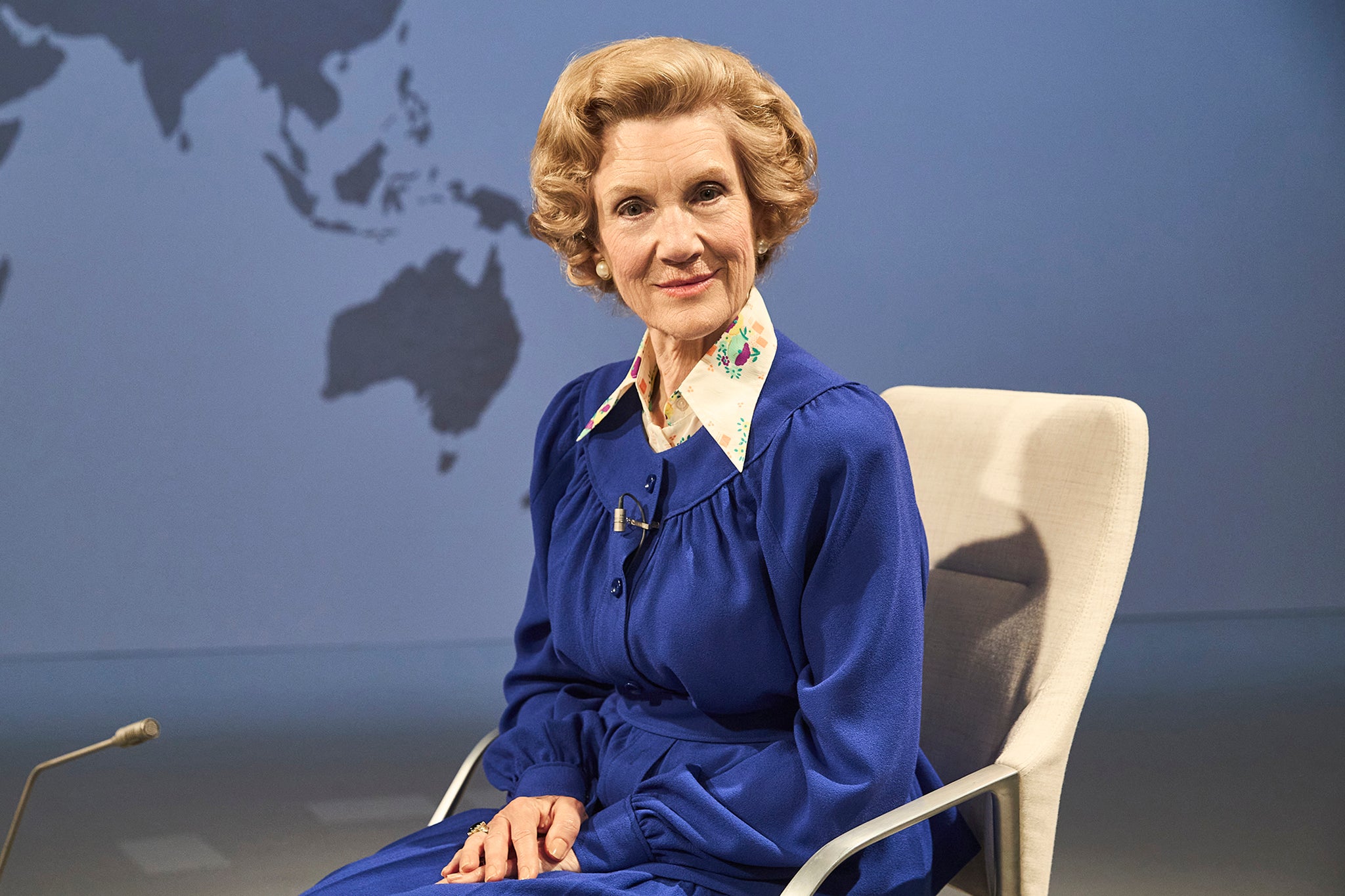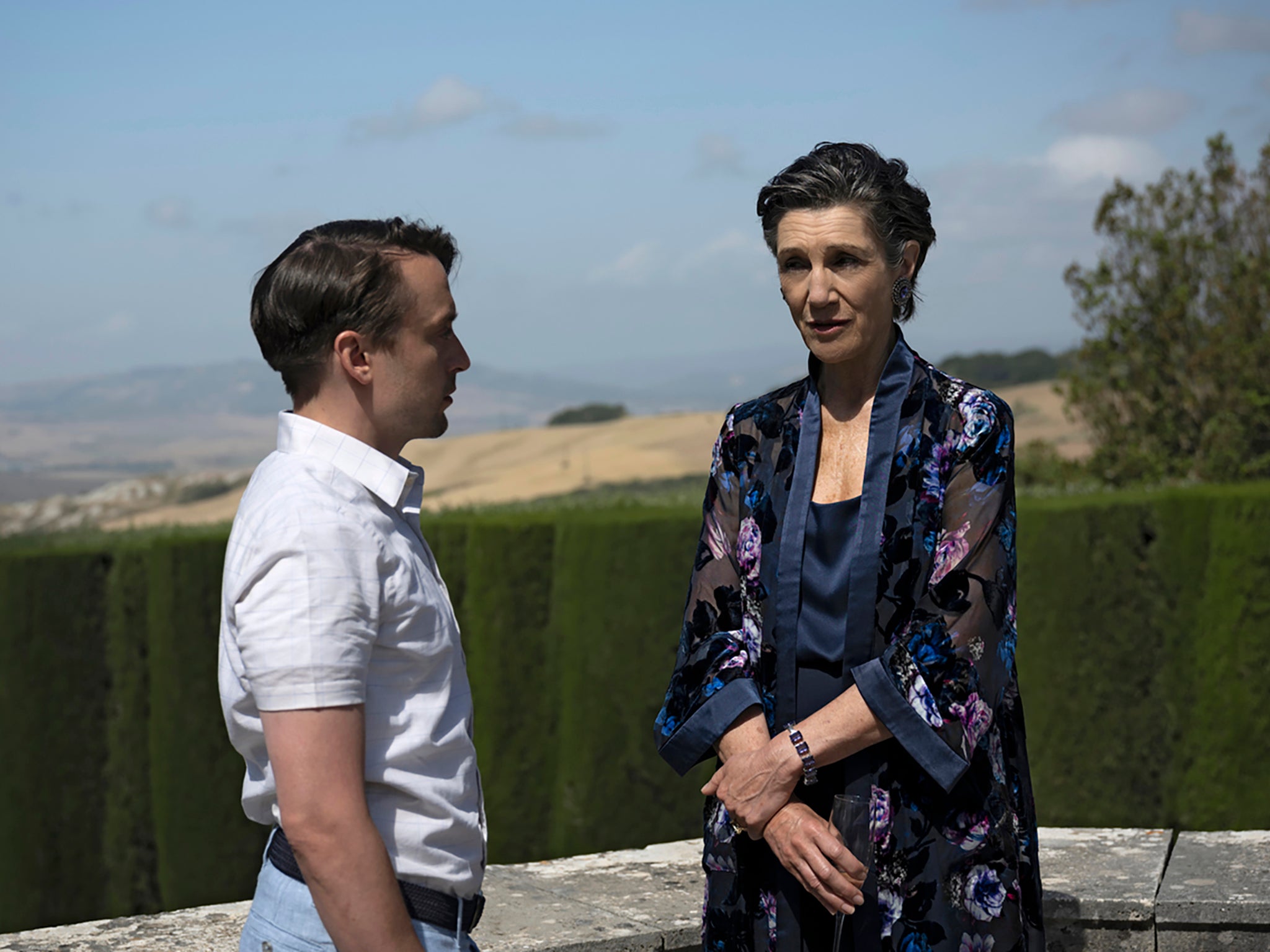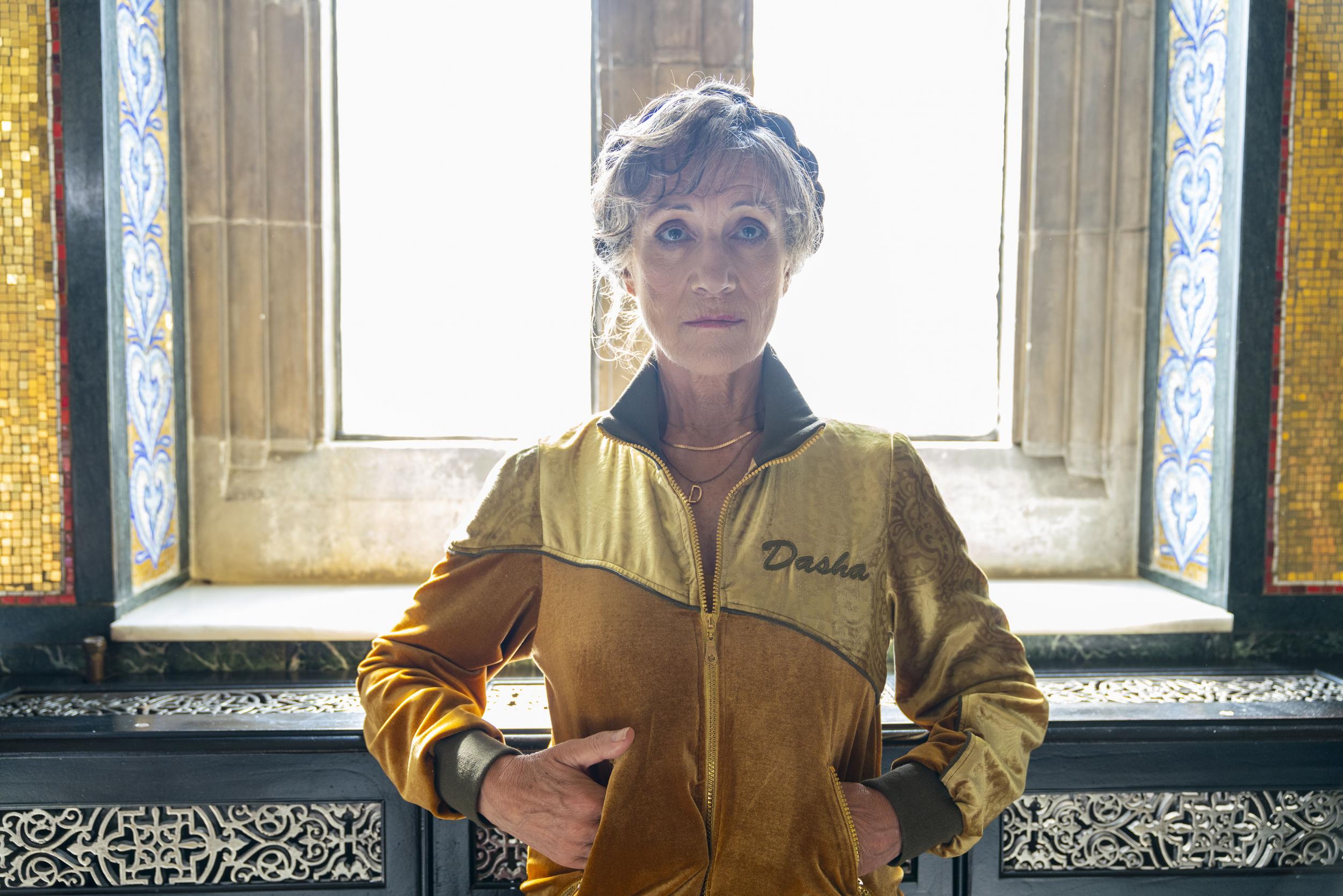People are always saying I play horrible women!” says an amused Harriet Walter. It’s hard to argue with this assertion; after all, she has something of a track record. There’s the odious Fanny Dashwood in Ang Lee’s beloved 1996 Sense and Sensibility, and ice queen Lady Caroline Collingwood in the smash-hit HBO show Succession – not to mention her scene-stealing performances as Russian assassin Dasha in Killing Eve and emotionally distant mother Deborah Welton in Ted Lasso. In short, the veteran British actor has spent much of her 45-year career playing very nasty women indeed.
“I sometimes imagine having a fantasy dinner party with them all…” she muses, and we both pause for a moment, picturing that surreal, painfully awkward social gathering with a kind of horrified fascination. “To me, they’re all horrible in very different ways.”
The latest in the lineup is a real humdinger: Margaret Thatcher. Walter plays her opposite Steve Coogan in a new two-part Channel 4 docudrama, Brian and Maggie, written by Olivier Award winner James Graham and directed by Stephen Frears (he of State of the Union and A Very English Scandal fame). Adapted from a chapter in Rob Burley’s 2023 book Why is This Lying Bastard Lying To Me? and based on real events, the show is a dramatisation of the game-changing 1989 televised interview between Thatcher and journalist Brian Walden, aired three days after the resignation of Nigel Lawson as chancellor. Thatcher visibly floundered under Walden’s unrelenting questioning, and the encounter is widely believed to have been instrumental in her subsequent political fall from grace: she resigned a year later.
Unlike the impressive roster of fellow thesps who have taken up the Thatcher mantle before her (including Gillian Anderson, Lindsay Duncan, Lesley Manville and Meryl Streep), Walter has previous form. “I played [Thatcher] in an agitprop thing in 1975 when she had just become the leader of the Conservatives, before they got into power,” she tells me, the light sketch of a smile playing across her face. “I wore a huge, almost Spitting Image mask and a headdress. I didn’t know much about her, and nor did anybody else – so I got away with a very generalised portrait. It was quite different to Brian and Maggie…”
Different is an understatement. Far from taking a generalised approach, Walter brings a screw-tight precision to the role to produce one of the most nuanced Thatcher portrayals we’ve seen on screen. There are glimmers of vulnerability, even fear, simmering beneath the never-surrender mask and iron will. There are flashes, too, of the greengrocer’s daughter who had to fight and claw her way to the top amid a bloated class of overly entitled, useless men. Walter watched “yards and yards and yards” of footage of Thatcher, both on and off duty, in order to meticulously emulate her distinctive voice and walk while avoiding crude mimicry.
“I did shift in terms of regarding her as a human being rather than a hate figure,” she reveals. “I didn’t want to make any apology for her, but I wanted to make her a 360-degree human because that’s what interests me. I’m not interested in beaming back out people’s prejudices or judgements.”

There’s something rather endearing about the stark contrast between Walter’s real-life persona – impassioned yet soft-voiced, pausing frequently to frame her thoughts just so – and her clipped, severe onscreen one. Swathed in a black turtleneck jumper, her porcelain-pale skin almost glowing against the dark cropped hair that falls casually across her forehead, Walter emanates a humility and an openness that couldn’t be further from the flinty female characters she specialises in.
After graduating from the London Academy of Music and Dramatic Art in the early Seventies – and following an extensive, award-winning stint with the Royal Shakespeare Company – Walter started notching up TV and film credits in earnest from the Nineties onwards. With her cut-glass tones and curiously timeless features, she’s frequently popped up in high-production period dramas over the years, including Bright Young Things, Atonement, Downton Abbey and The Crown. But, just like a select group of her esteemed contemporaries and elders, Walter has arguably gained increasing recognition as she’s aged. This later-in-life accomplishment places her firmly in the pantheon of much-loved British doyennes – alongside Maggie Smith, Helen Mirren and Judi Dench – who have managed to secure continuing career success well into their eighth decade.
She hasn’t “dared” watch herself in Brian and Maggie yet; when I tell her how much I liked it, I can almost see the struggle to accept the compliment as she wrestles with her own internal critic. “I’m not particularly keen to watch it. But I think the writing was so extraordinary, and the work done by everybody else was so extraordinary, that I’m willing to believe you enjoyed it very much.”

Watch Apple TV+ free for 7 days
New subscribers only. £8.99/mo. after free trial. Plan auto-renews until cancelled
Try for free

Watch Apple TV+ free for 7 days
New subscribers only. £8.99/mo. after free trial. Plan auto-renews until cancelled
Try for free
Though Walter initially claims not to be “terribly political”, our ensuing conversation suggests otherwise. “I’m a woolly liberal, if you like,” she proffers when I ask whether the activism of her youth has been replaced by a more centrist stance. “I’m a humanitarian egalitarian. And when hard politics crosses that and says ‘You’re naive’, I still defend my position – however impractical it seems to people who purely think in terms of profit and economic logic. I will always look a bit foolish to those people.”
In fact, Walter could be held up as the epitome of the much-maligned “metropolitan elite, champagne socialist” we’re always hearing about in political debate. She lives in west London, has a second home in Dorset, and spends a portion of her time in New York (where her husband of 14 years, fellow actor Guy Paul, is from). She’s all in favour of higher tax: “If you really want things to be different, then you’ve got to agree to sacrifice something,” she reasons. “I’m willing to pay a bit more tax in order to have better schools, better arts funding, better education, better health. That’s my philosophy.”
The 74-year-old wasn’t a child of Thatcher herself, having come of age against the idealistic and pacifism-loving backdrop of the Swinging Sixties. “I’m still a child of that time in some ways,” she says. “The shocking thing for our generation is that, for the first 20 years of my life, there was a basic optimism about the future. That’s now very crushed.”

Walter is at least optimistic about the fact that the UK currently has a Labour government, though she believes we’re “pretty rough” on today’s politicians, and lambasts the media for concocting a narrative that “it’s all going to go like the 1970s, it’s all going downhill, before anybody’s even had a chance”. The truth – that patience is required while those in charge attempt to sort out finances and enact the policies they promised – is “boring”, suggests Walter. “I think it makes a good story to go into the polarised extremes. Look, I’m blaming the media, and I know you’re one of them… but you know what I mean?”
I do. And it’s a relevant topic, given that Brian and Maggie is partly about the shapeshifting relationship between the press and politicians. Thatcher and Walden’s connection crosses all manner of invisible lines in the early years – the pair shared cosy post-work drinks and jokes, and Walden even collaborated with Thatcher on her electoral campaign speech for the Wembley rally in 1983 – before abruptly transitioning, during that fateful interview, into the holding-power-to-account dynamic we expect of robust political journalism today.
There seems to be, I observe, a zeitgeist fascination with going behind the scenes of big, watershed broadcast interviews. Brian and Maggie follows on from not one, but two dramatisations of Emily Maitlis’s infamous Newsnight interview with Prince Andrew: A Very Royal Scandal and Scoop. Why this newfound interest in seeing, for want of a better term, how the sausage gets made?

“That’s a good way of putting it!” she enthuses. “I think because that’s the only mechanism we’ve got for the general public to see into somebody who’s very well known. If you want to get to the nitty-gritty, you need prodding, probing journalism aimed at getting behind the front that people and their PR team are concocting.”
It’s very clear that had Walter ever met Thatcher, they wouldn’t have seen eye-to-eye. “She would have no time for me whatsoever: I absolutely epitomise everything she was against!” she says. Still, Thatcher was a rare woman triumphing in a world run by men. Does Walter believe anything has changed?
“We’ve got to say it’s better,” Walter concedes. “Who gets into the club today is different. But I can’t say that the culture of the club has necessarily changed as much as we’d like…” She highlights the divide between the hardworking, ethical, anti-privileged side of politics and “the kind of Boris Johnson, you know, ‘don’t be so boring’ mentality, the ‘We know what we’re doing, it’s going to be fun’ approach. You know, that ‘politics should be amusing’ kind of crap.”
Thatcher, Walter believes, would look at the contemporary political landscape and think, “God, this is not grown up.” “And she would certainly feel that nobody since her had got it right,” she adds. It’s this insight into her subjects that enables Walter to transform the “horrible women” she’s played over the years into fully fleshed-out people – not least of all Succession’s Caroline Collingwood. The epitome of an icy, emotionally constipated, upper-class Englishwoman, the Roy family matriarch could all too easily be played as a kind of pantomime villain. Lady Collingwood is a master of withholding and manipulation, capable of obliterating her children’s fragile self-esteem armed with nothing more than a well-timed, savage one-liner – but Walter doesn’t see her that way.
“I always come at characters from a non-judgemental place,” she shrugs. “You can judge them however you like, but I’m not going to. I’m going to find out what they want and why they do it.”
Walter describes feeling like “a proud mother” seeing her onscreen children’s post-show successes. “Both my boys are up for a best supporting Bafta,” she clucks (Kieran Culkin for A Real Pain and Jeremy Strong for The Apprentice – both performances have since earned them Oscar nominations). Though glad her “sons” have been recognised, she’s “torn, you know – it’s awful! I don’t like awards for that reason. I don’t like actors having to compete against one another.”
While she’s made a name for herself internationally through her carefully curated selection of onscreen work, it is theatre – more specifically, Shakespeare – that has always been Walter’s first love. This summer she will be returning to the stage for the first time in nearly a decade, playing Rosalind in As You Like It as part of a season at Theatre Royal Bath curated by Ralph Fiennes. It may seem a curious choice, given that Rosalind is conventionally played as a young woman, but there seems to be an ongoing trend for age-blind casting; Geraldine James, also 74, played the same role in a 2023 Royal Shakespeare Company production.

Last autumn, meanwhile, saw the publication of her book She Speaks!, in which Walter imagines what Shakespeare’s female characters might have said had they been given a touch more airtime.
Have things improved for women in terms of the quantity and quality of parts since the Bard’s day? “There’s an improvement in numbers and variety, but I don’t think we’ve really got to the bottom of understanding women through the stories we tell,” says Walter ruefully. She concedes there are some “wonderful” contemporary women writers – the predominantly female team behind Killing Eve, in which Walter had a recurring role, being a great example. “But it’s been so, so deep in our culture for millennia to put women as second place, that all our archetypal stories tend to be male-driven. It needs a really radical revolution to change that.”
She quotes a line she wrote for one of Shakespeare’s heroines in She Speaks!: “‘The topsoil shifts. The roots remain below.’ We’ve got a lot of topsoil shifting, but the actual roots of misogyny are still deep in there somewhere. It’s pessimistic, but I think that we can keep improving.”
Walter’s body of work is undoubtedly part of that improvement. After all, behind every “horrible woman” is surely a complex, multifaceted, misunderstood one, just waiting to be uncovered…
‘Brian and Maggie’ begins on Channel 4 on Wednesday 29 January





